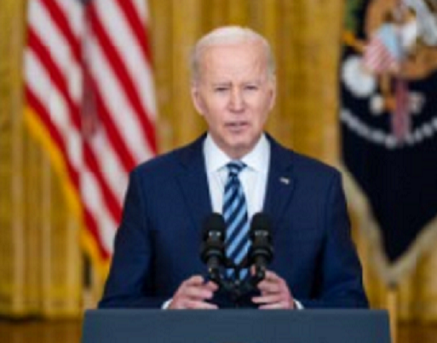-
Biden bans Russian-affiliated ships from US ports
-
US President declares Russia’s invasion and continuing brutal war against Ukraine as a national emergency that has driven him to ban Russian-affiliated ships from US ports and waters
-
The prohibition prompts extensive administration review to ensure the ban on Russian ships would not seriously hurt US supply chains, according to Reuters
-
The prohibition is effective April 28, 2022
US President Joe Biden announced on April 21 a ban on Russian-affiliated ships from US ports and waters and declared Russia’s invasion of Ukraine as a national emergency that threatens to disturb US international relations.
Biden invoked his powers under the US Constitution and relevant laws to prohibit the anchorage and port visits of Russian or Russia-affiliated vessels, joining Canada and European nations in increasing pressure on President Vladimir Putin to end the war in Ukraine.
The prohibition is effective April 28, 2022.
Biden said he was taking the measure in response to Russia’s continued “premeditated, unjustified, unprovoked, and brutal war against Ukraine” that constituted or threatened to disturb America’s own international relations.
“That means no ship, no ship that sails under the Russian flag or that is owned or operated by a Russian entity, will be allowed to dock in a United States port or access our shores. None,” Biden said.
READ: Biden’s remarks providing updates on Ukraine and Russia
Sources cited by Reuters in a report said that in 2021 Russian vessels made about 1,800 visits to US ports, less than 3% of all traffic. It reported that people briefed on the matter said nearly 90% of that traffic was oil imports, now the subject of a US ban as a result of the invasion of Ukraine.
Biden’s order released Thursday authorizes the Homeland Security Department to issue rules “to regulate the anchorage and movement of Russian-affiliated vessels, and delegate to the secretary my authority to approve such rules and regulations”.
The order aims to prevent Russian ships from entering the United States even if they are reflagged at sea and covers Russian-flagged, owned or operated ships.
Biden’s order only exempts Russian-affiliated vessels used in transporting source material, special nuclear material, and nuclear byproduct material for which the Secretary of Energy, in consultation with the Secretary of State and the Secretary of Commerce, determines no viable source of supply is available that would not require transport by Russian-affiliated vessels.
The order exempts as well Russian-affiliated vessels requesting only to enter US ports due to force majeure, solely to allow seafarers of any nationality to disembark or embark for crew changes, emergency medical care or for other humanitarian need.
Reuters said the issue prompted an extensive Biden administration review to ensure the ban on Russian ships would not seriously impact US supply chains. The order does not seek to ban the shipment of all Russian cargo.
Canada barred Russian-owned ships from Canadian ports and waters. Many European countries including Bulgaria, Estonia and Italy have followed suit.
The US previously barred Russian airplanes from its airspace, following a similar action by Canada and European nations. Biden also banned oil imports from Russia.
Biden also stepped up US support for embattled Ukraine by seeking Congress’ approval of a new US$800 million military aid package that will include heavy artillery weapons, dozens of longer-range howitzers and 144,000 rounds of ammunition.
He promised an additional US$300 million economic aid to Ukraine and to admit 100,000 Ukrainian refugees into the United States.
Paraphrasing a famous quote from President Theodore Roosevelt, Biden told reporters: “Sometimes we will speak softly and carry a large javelin, because we’re sending a lot of those in as well.”
Biden was referring to US anti-tank missiles that Ukrainian fighters used effectively to thwart the first phase of the invasion by destroying hundreds of Russian tanks and support vehicles in enemy columns on roads leading to the capital Kyiv.
The setbacks forced Putin to recall what’s left of his invasion force and concentrated a new and bigger force on an ongoing campaign to capture the eastern Ukranian region of Donbas ostensibly to secure an overland corridor to Russian-held Crimea and the Black Sea.





